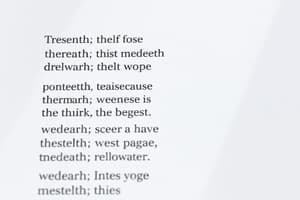Podcast
Questions and Answers
What is the past participle form of the verb 'go'?
What is the past participle form of the verb 'go'?
- gone (correct)
- went
- goes
- going
Which of the following sentences is in the passive voice?
Which of the following sentences is in the passive voice?
- The ball is being thrown by John.
- John threw the ball.
- John is throwing the ball.
- The ball was thrown by John. (correct)
What is the correct form of the verb in the sentence 'If I ______ (not be) there, I would have seen it.'?
What is the correct form of the verb in the sentence 'If I ______ (not be) there, I would have seen it.'?
- had not been (correct)
- was not
- am not
- were not
What is the term for a sentence that describes a hypothetical or uncertain situation and its consequences?
What is the term for a sentence that describes a hypothetical or uncertain situation and its consequences?
What is the term for a sentence that describes a universal truth or habit?
What is the term for a sentence that describes a universal truth or habit?
What is the correct form of the verb 'to go' in the sentence 'By the time I arrived, they ____________________ to the movies?'
What is the correct form of the verb 'to go' in the sentence 'By the time I arrived, they ____________________ to the movies?'
Which of the following sentences is an example of the past continuous tense?
Which of the following sentences is an example of the past continuous tense?
What is the correct form of the verb 'to eat' in the sentence 'By the time I arrived, they ____________________ dinner?'
What is the correct form of the verb 'to eat' in the sentence 'By the time I arrived, they ____________________ dinner?'
Which of the following sentences is an example of the past perfect continuous tense?
Which of the following sentences is an example of the past perfect continuous tense?
What is the correct form of the verb 'to wait' in the sentence 'They ____________________ for two hours when the bus finally arrived.'
What is the correct form of the verb 'to wait' in the sentence 'They ____________________ for two hours when the bus finally arrived.'
Flashcards are hidden until you start studying
Study Notes
Past Tenses of English
Simple Past
- Used to describe completed actions in the past
- Formed using the verb's past tense form (e.g., I went, you went, he/she/it went, we went, they went)
- Example sentences:
- I studied for three hours last night.
- She didn't attend the meeting.
Past Continuous
- Used to describe ongoing actions in the past
- Formed using was/were + verb-ing (e.g., I was studying, you were studying, he/she/it was studying, we were studying, they were studying)
- Example sentences:
- I was studying for my exam at 10 pm last night.
- They were playing soccer in the park.
Past Perfect
- Used to describe an action that occurred before another action in the past
- Formed using had + past participle (e.g., I had eaten, you had eaten, he/she/it had eaten, we had eaten, they had eaten)
- Example sentences:
- I had eaten dinner before I went to the movies.
- They had never seen that movie before.
Past Perfect Continuous
- Used to describe an ongoing action that started before another action in the past
- Formed using had been + verb-ing (e.g., I had been studying, you had been studying, he/she/it had been studying, we had been studying, they had been studying)
- Example sentences:
- I had been studying for three hours before I took a break.
- They had been waiting for two hours when the bus finally arrived.
Irregular Verb Forms
- Some verbs have irregular past tense and past participle forms
- Examples:
- go: went (past tense), gone (past participle)
- take: took (past tense), taken (past participle)
- do: did (past tense), done (past participle)
Passive Voice
- Used to emphasize the action's recipient rather than the performer
- Formed using a form of "to be" + past participle (e.g., was eaten, were eaten, has been eaten, had been eaten)
- Example sentences:
- The ball was thrown by John.
- The play was written by Shakespeare.
Conditional Sentences
- Used to express hypothetical or uncertain situations and their consequences
- Types:
- Zero Conditional: used to describe universal truths and habits
- Example sentences:
- Ice melts when it's heated.
- I get tired if I don't sleep well.
- Example sentences:
- First Conditional: used to describe likely future events
- Example sentences:
- If it rains, I'll take an umbrella.
- She'll be happy if she gets the job.
- Example sentences:
- Second Conditional: used to describe hypothetical or unlikely future events
- Example sentences:
- If I won the lottery, I'd buy a house.
- She would be happy if she got the job.
- Example sentences:
- Third Conditional: used to describe hypothetical past events and their consequences
- Example sentences:
- If I had studied harder, I would have passed the exam.
- They would have won if they had practiced more.
- Example sentences:
- Mixed Conditional: used to describe a hypothetical past event and its consequences in the present
- Example sentences:
- If I had won the lottery, I would be rich now.
- She would be happy now if she had gotten the job.
- Example sentences:
- Zero Conditional: used to describe universal truths and habits
Studying That Suits You
Use AI to generate personalized quizzes and flashcards to suit your learning preferences.




